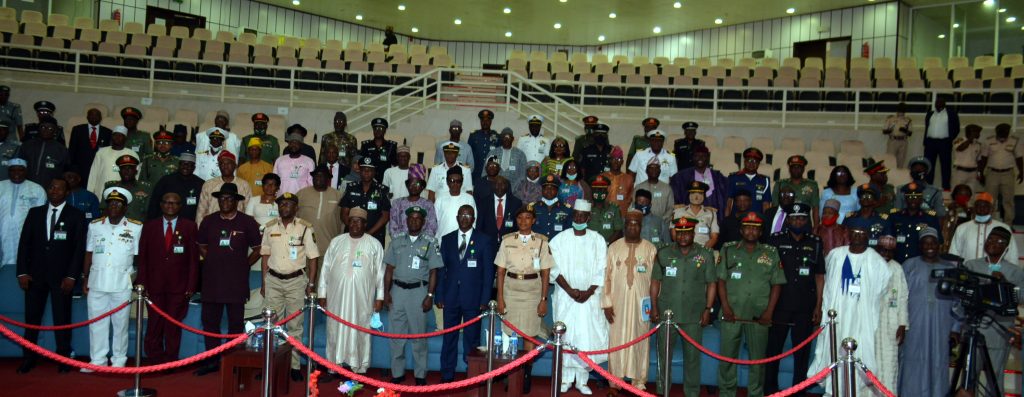About
ABOUT THE NATIONAL INSTITUTE FOR POLICY AND STRATEGIC STUDIES (NIPSS), KURU
The fast pace of change and national development in countries across the world, especially over the past three decades, has been driven by paradigm transitions towards “thinking globally and acting locally”. Successful national growth and development have therefore been accomplished under inherently deft, visionary and people-oriented national policies and strategies.
The Nigerian State had foreseen the need for qualitative input into the national policy making process by 1979, hence The National Institute for Policy and Strategic Studies (also called The National Institute or NIPSS) was established by Decree number 20 of 1979, now Cap N-51 Laws of the Federation of Nigeria, 2004. The Institute was conceived as a high-level institution with the primary objectives of serving as the nation’s foremost policy think-tank to develop a crop of top-class technocrats of high intellectual capacity, who will conceptualize and anchor the implementation of innovative and dynamic policy initiatives and strategies, critical for national development.
The National institute serves as a high-level Centre for reflection, research and dialogue where, academics of excellence, seasoned policy initiators and executors and other citizens of mature experience and wisdom drawn from all walks of life, meet to reflect and exchange ideas on the great issues of society, particularly as they relate to Nigeria and Africa within the context of a constantly changing world.
The mission of the National Institute is “to serve as the Centre for policy, Advocacy, Advice and Training for Nigeria, West Africa and Africa in the context of a dynamic and changing world”.
Its vision is “To be the Apex Centre for policy, research and reflection for a better Nigeria and human society”.
The motto of the Institute is “Towards a better society”.

The National Institute, amongst other things:
- Conducts courses for top-level policymakers and executors drawn from different sectors of the country, with a view to expanding their outlook and perspectives and stretching their conceptual capacity and qualities of discernment and analyses, thereby helping to improve their overall performance in their different fields.
- Organizes and carries out on an interdisciplinary basis, indebt research into the social, economic, political, security, scientific, cultural, and other problems facing Nigeria, with a view to contributing to the search for their solutions.
- Conducts seminars, workshops, and other action-oriented programs for leaders and potential leaders in the public service, the private sector, political organizations, professional bodies, and other groups, with a view to promoting, defining, and enhancing the appreciation for long-range national plans and objectives.
- Publishes books, journals, monographs, and other materials in the interest of the nation, as a contribution to knowledge and for a better national and international understanding.

POLICY RESEARCH AND THINK-TANK
The role of the National Institute is not limited to the training of high level policy makers and executors. As the nation’s topmost policy think-tank, the Institute, through its Directorate of Research, makes direct and regular contributions to the National Policy Process in terms of initiating and evaluating various policy initiatives and strategies.
Manned by a team of skilled and highly competent research fellows, the Directorate of Research organizes seminars, conferences and workshops, brainstorming sessions and other strategic engagements and collaborations. The Directorate also provides significant support to the Senior Executive Course as well as submits regular policy briefs and reports to the government.
Through these activities and its reports and publications, The National Institute has built up a rich reservoir of knowledge that can be harnessed to drive Nigeria’s national development aspirations. As a contribution to the deepening of democracy in Nigeria and Africa, the Institute also has a Centre known as The Political Parties Leadership and Policy Development Centre, which is specially dedicated to building the capacity of political parties to operate professionally and effectively. Established in collaboration with the United Nations Development Programme (UNDP), the Political Parties Centre is domiciled in the Directorate of Research and is involved in capacity building, training, election monitoring and other activities which enhance democracy in Nigeria and Africa.
PROJECTIONS AND EXPECTATIONS
The National Institute aims to be one of the top three think-tanks in Africa by the Year 2025. Towards realising this important aspiration, Management of the National Institute has put in place measures to strengthen its research, reflection, training and publication endeavours as well as its partnership and collaborative efforts with similar think-tanks in Nigeria and outside the country.
While the National Institute has contributed immensely to national development as Nigeria’s apex policy think-tank, through numerous evidence-based policy recommendations as well as through constant, constructive engagement with policy makers at all levels, the dynamics of changing global environment underscore the need for the Institute to re-imagine its role and reposition itself for increased relevance in the policy arena.
The National Institute is currently implementing its Strategic Plan, 2019 – 2023. The Plan outlines clear strategies to optimise human capital and physical infrastructure to strengthen the delivery of its Senior Executive Course and other special programmes aimed at providing answers to various developmental challenges in the country. Management has also put in place various initiatives to enhance its online presence and provide open access to research and learning resources as a strategy to enhance visibility of the Institute. Meanwhile, as a consequence of its repositioning agenda, the National Institute has continued to attract top scholars from the nation’s foremost academic institutions. The Institute also continues to enjoy immense goodwill from the government and other stakeholders in the Nigerian project, in the collective aspiration towards a better society.

